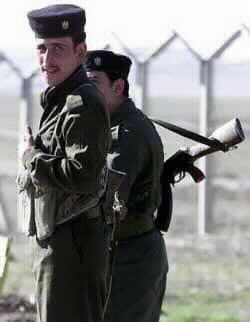Secretary of State Colin Powell said on Saturday he had extensively discussed the use of Turkish bases for a possible attack on Iraq, as pressure built to allow U.N. arms inspectors more time to do their job. The inspectors are due to make a key report to the U.N. Security Council on Monday on progress in their search for banned nuclear, chemical and biological weapons Washington says Baghdad possesses. Iraq denies having such weapons programs.
In Washington, U.S. officials said the report would kick off a final phase of consultations as the United States neared a decision on toppling Iraqi President Saddam Hussein by force if necessary.
Bush & Powell Discusses Iraq With World Leaders
President Bush discussed the standoff with Iraq with the leaders of Italy and Japan as Washington stepped up a diplomatic offensive ahead of the report. He also discussed North Korea with Japanese Prime Minister Junichiro Koizumi, a White House spokesman said.
Powell said he had had "an extensive discussion" on the use of Turkish bases in a meeting with Turkish Prime Minister Abdullah Gul and ruling AKP party leader Tayyip Erdogan on the sidelines of the Davos gathering.
Asked if a deadline for agreement came up during the 75-minute meeting, Powell said: "We didn't discuss deadlines. They have a good sense of the timing that's involved.
"They understand our needs and I have a complete understanding of their political situation and their parliamentary situation, and we're in close contact with each other."
Gul called the talks "fruitful; and useful," adding: "War is nobody's choice, we want peace. But of course at the same time the preparation for all kinds of scenarios is very normal."
U.S. sources in Washington said the United States wanted to put at least 15,000 troops in Turkey to open a "northern front" against Baghdad in the event of war.
In return for Turkish cooperation, Washington was offering an economic and military aid package worth nearly DLRS 14 billion over three years.
EU for More Time to UN Inspectors
Greece, which holds the rotating presidency of the European Union, said there was an emerging consensus in the 15-nation bloc that the inspectors should be given more time if chief U.N. inspector Hans Blix and International Atomic Energy Agency chief Mohamed ElBaradei requested it.
"Obviously there is a consensus that, yes, we should give them the necessary time if they ask," Greek Foreign Minister George Papandreou told a news conference at the World Economic Forum meeting at the Swiss resort of Davos.
Papandreou said he expected EU foreign ministers meeting in Brussels on Monday to declare full support for U.N. efforts to deal with the problem of Iraq's suspected weapons of mass destruction and urge a diplomatic solution to the crisis.
Hizbollah Warns U.S.
In Damascus, Sheikh Hassan Nasrallah, leader of the Lebanese resistance group Hizbollah, warned Washington an attack on Iraq would lead to an Arab war against the United States. He was speaking at a conference on boycotting Israel and its allies.
"If this war broke out it would not be over in a year or two," he said arguing that no military power can win a war against Arabs because they would fight Americans in a fashion similar to the Palestinian uprising and the Lebanese resistance against Israeli occupation troops.
Anglo-American Jets Attack Targets in Southern Iraq
U.S. and British aircraft hit two targets on Friday and Saturday in southern Iraq's "no fly" zone, set up after the 1991 war to protect Shi'ite Muslims in the south from Baghdad's forces. A similar zone protecting Kurds exists in the north.
Iraqi Parliament Speaker Saadoun Hammadi told reporters in New Delhi his country would "use every method to inflict damage and casualties against those who invade our country."
Western 'Human Shields' Head for Iraq
Proclaiming they were prepared to die if necessary to stop war in Iraq, the first convoy of Western "human shield" volunteers drove out of London on Saturday on double-decker buses bound for Baghdad.
The roughly 50 volunteers, ranging from a 19-year-old factory worker to a 60-year-old former diplomat, formed the vanguard of a series of caravans organizers say will take hundreds, possibly thousands, of anti-war activists to Iraq.
Dismissing criticism by some that they are naively playing into Iraqi President Saddam Hussein's hands, the volunteers plan to fan out to heavily populated areas of Baghdad and other parts of the country as a deterrent to possible U.S.-led bombing.
Saturday's convoy -- like others planned for early February -- will travel across Europe, picking up more people, loading provisions and stopping to promote their cause. The three buses were led by a white taxi with a huge peace flag on the top.
In the Muslim world, the main rallying point for would-be human shields is in Jordan. There, a campaign led by leftist parties and civic bodies is seeking 100,000 volunteers.
PHOTO CAPTION
An Iraqi soldier guards a military installation near the town of Mosul, north of Baghdad, January 25, 2003. The United States said on Saturday at least a dozen nations would back an attack on Iraq, even without a fresh U.N. resolution, but Arab and European leaders appealed for weapons inspectors to be given more time. Photo by Akram Saleh/Re
- Author:
& News Agencies - Section:
WORLD HEADLINES


 Home
Home Discover Islam
Discover Islam Quran Recitations
Quran Recitations Lectures
Lectures
 Fatwa
Fatwa Articles
Articles Fiqh
Fiqh E-Books
E-Books Boys & Girls
Boys & Girls  Hajj Rulings
Hajj Rulings Hajj Fatwas
Hajj Fatwas














